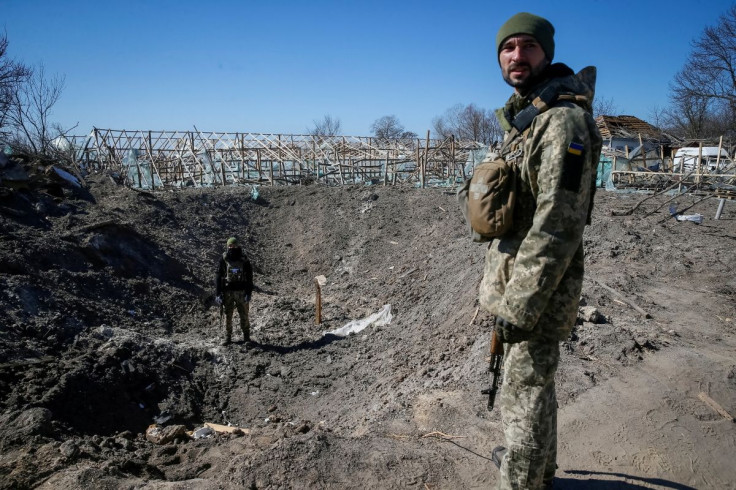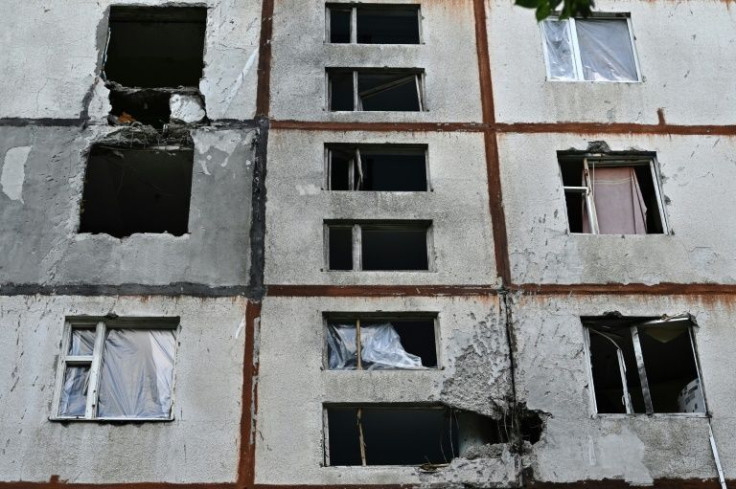How To Survive Russia's Cluster Bomb Attack: Journalist Describes Experience With Banned Ammo

KEY POINTS
- Andriy Dubchak found himself in the middle of a Russian cluster bomb attack in Bakhmut, Ukraine, in late July
- The Ukrainian photojournalist and his son, who had accompanied him, survived and were able to escape
- Both Russia and Ukraine have been accused of using cluster munitions in their ongoing conflict
An award-winning Ukrainian journalist revealed that he survived a Russian strike that used widely banned munitions in Ukraine's occupied Donetsk region.
Andriy Dubchak was filming a Russian artillery barrage on the outskirts of Bakhmut, Ukraine, in late July with his son when they were caught up in a cluster bomb attack, U.S. government-funded outlet Radio Free Europe/Radio Liberty (RFE/RL) reported.
"It was like hell in a few seconds," the photographer, who has worked with the outlet's Ukrainian service since 2003, said in an interview with RFE/RL.
"I tried to stand up and go to my son's position, but probably these cluster munitions also have timers. I just stand up and [there is a] new explosion, lie down, just stand up, one explosion, lie down, just stand up, explosion, lie down," he recalled.
The attack reportedly resulted in fragments tearing through Dubchak's trousers, but he and his son survived and were able to escape.
It also blew out the windows of Dubchak's car and ripped through the vehicle.
Under the Convention on Cluster Munitions, a 2008 international treaty that prohibits all use, transfer, production and stockpiling of cluster bombs, cluster munitions are defined as munitions that are designed to disperse or release explosive submunitions, also sometimes referred to as "bomblets."
About 108 countries have signed the convention, but both Russia and Ukraine, which have been accused of using cluster munitions in their ongoing war, have opted not to join.
Other countries that produce or stockpile significant quantities of cluster munitions such as the U.S. and China also opposed the treaty and have not signed it.
These munitions are "legitimate weapons with clear military utility," the U.S. Department of Defense insisted.
Russia may also share the perspective as, according to Dubchak, cluster munitions play a major role in its strategy.
"For them, it's very easy to use at a long distance, and it's safe for the Russian Army. At the same time, it's very effective," the journalist said.
In a report released on Aug 25, Human Rights Watch called on both Russia and Ukraine to stop using cluster munitions as 689 civilian casualties from the weapons had been registered in Ukraine since the start of their conflict.
"The immediate and long-term suffering that cluster munitions cause civilians makes their use today in Ukraine unconscionable as well as invariably unlawful," Mary Wareham, the New York-based rights group's arms advocacy director, was quoted as saying in a statement.
A total of 5,718 civilians have been killed in Russia's invasion of Ukraine, according to the latest data provided by the Office of the United Nations High Commissioner for Human Rights.
"Most of the civilian casualties recorded were caused by the use of explosive weapons with wide area effects, including shelling from heavy artillery, multiple launch rocket systems, missiles and air strikes," the agency said in a report.

© Copyright IBTimes 2025. All rights reserved.




















